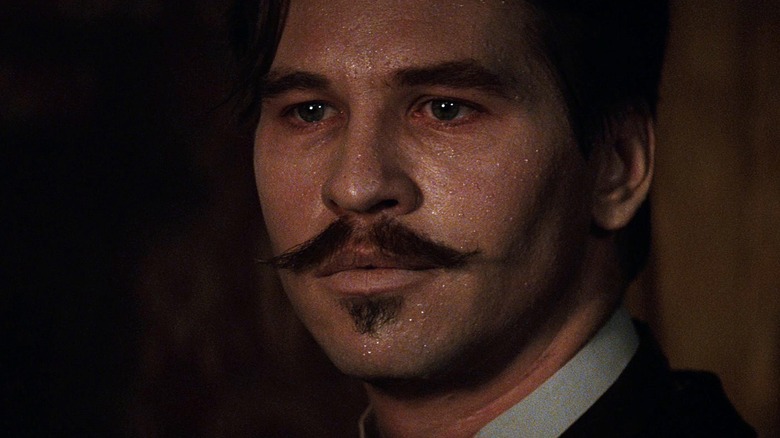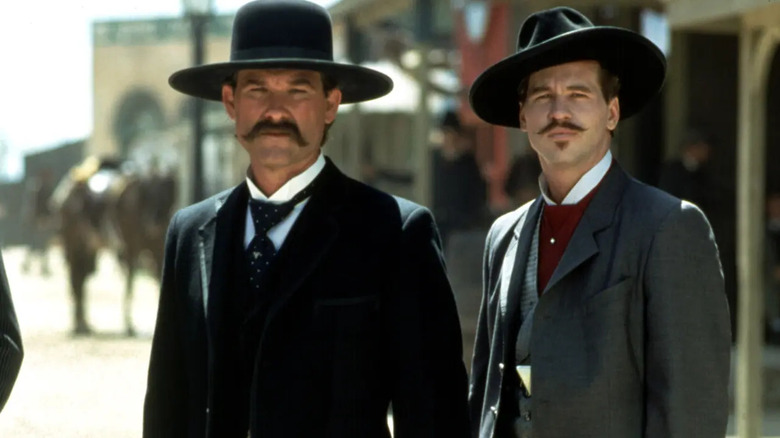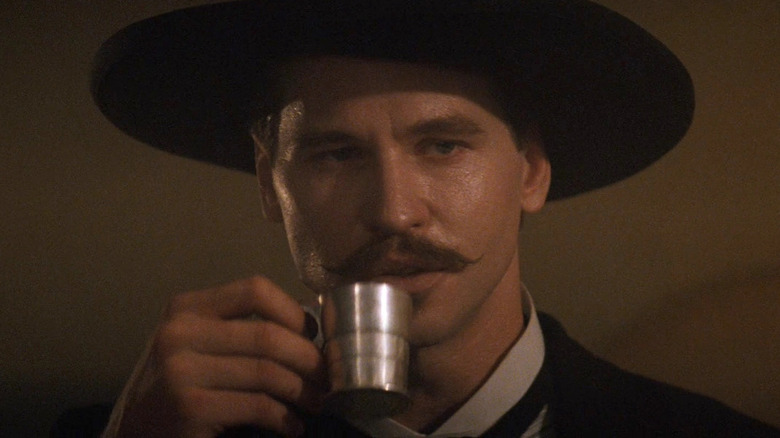Val Kilmer Had A Secret Weapon Working On Tombstone
One trade secret that actors often use to prepare for biography pictures is to spend time with the person they are portraying. Leonardo DiCaprio secretly spent several days with Frank Abagnale to prepare for "Catch Me If You Can," and Tony Mendez took Ben Affleck to some old CIA hangout spots during his preparation for "Argo."
But what if the character you're playing died 140 years ago in the Wild West? That was a question Val Kilmer had to answer when he played Doc Holliday in the 1993 Western "Tombstone." In the beloved Western that helped immortalize the line "I'm your Huckleberry," Kilmer plays an ornery but well-meaning gunfighter. We called it the best performance of Val Kilmer's career.
There was plenty of literature about Doc Holliday at Kilmer's disposal but bringing a long-dead Western folk hero to life on the big screen was still a challenge. Thankfully, Kilmer had a secret weapon to help him prepare for the role of a lifetime.
He trained with a dialect coach
Doc Holliday was an enigmatic character. Despite his raucous ways as a known gambler and drinker, in "Doc Holliday: The Life and Legend," author Gary L. Roberts points out that Holliday was brought up as a "Southern gentleman" in Georgia. After becoming a dentist, he moved West, where he befriended legendary lawman Wyatt Earp. He developed tuberculosis at a young age, which drove him to the dry Arizona climate.
Kilmer used this as a launching point for developing the Holliday character. "The main spine starts with the fact that the Southern aristocrat and his entire world had just been blown up and disappeared forever as if it had never existed," Kilmer said in a 2017 interview with Deadline.
Beyond that, Kilmer had what he considered to be a secret weapon in his acting arsenal. Kilmer said:
"I started with my secret weapon, the dialect and speech coach Tim Monich who works with the best people on earth, 24/7 for 30 years now. I told him I needed a dialect that didn't exist anymore and within days, there was a tape at my doorstep of a true Southern aristocrat who spoke so slowly and precisely about the theater he had restored."
Kilmer took what was on that tape and used it to shape the entire Doc Holliday character.
Death and dialect created the character
After perfecting Holliday's speech, Kilmer built the character from there. "The dialect was key," Kilmer said. "It informs even the walk, the thought process, his condescension."
The fact that Kilmer was playing a dying man wasn't lost on him, either. The actor said:
"Then, taking on the subject of death which [Holliday's] witnessed first-hand since he was perhaps ten years old. Ugly death. When you make that fact normal in a character profile that has to live, and not just exist as some well-written sentences in a drawer, a documentary film if you will, that is a living guide to life that works for every situation."
It seems death and dialect very much informed Kilmer's version of the gunslinger. In his book "I'm Your Huckleberry: A Memoir," Kilmer reflected on playing Doc Holliday. He wrote:
"His tongue is more lethal than his pistol. Throughout the drama, he's dying of both drink and tuberculosis. In playing him, I thought of what my dear friend the great screenplay writer Robert Towne had taught me: all insightful dialogue comes out of situations, not predeveloped thought. In that regard, I saw Doc's situation as dire. I also saw his action as defiance in the face of death. I loved him."
It was a brilliant approach by Kilmer to become a quick-witted figure. But it's also bittersweet now that a lengthy battle with cancer has made it difficult for Kilmer to speak. Like Holliday, Kilmer's weapon was his tongue. In "Tombstone," Doc Holliday says to Wyatt Earp, "There's no normal life, Wyatt. There's just life. Now get on with it." It's a line Kilmer has likely thought of as he enters a new phase of his career without the weapon he'd become so adept at using.


